大学英语作文之中西方文化对比 Lines and Circles,West and East
东西方文化差异英语作文

东西方文化差异英语作文•相关推荐regions, because people are affected by education, society and work experience. Take the cultural difference between the East and the West as the example, China is a country that endures high power distance while America endures lower power distance. Therefore, status symbol is very important for Chinese and a superior having the privilege is a matter of course. But people in America think that they are all equal. Besides, the westerns are individualistic while the easterners are more collectivistic. In individualistic societies, people focus on their own values and needs, relying on individual efforts to serve their interests. In the collectivistic nations, people combine themselves into one or several communities, finding their own place in the group and they mentally rely on the community, so harmony seems important in those nations. There are three main differences between the East and the West, namely uncertainty avoidance index, masculine versus femininity and long vs. short term orientation.【参考译文】东西方文化差异根据霍夫斯泰德对文化所下的定义,文化是在同一个环境中的人们所具有的“共同的心理程序”,是由相同的`教育背景和生活经历所决定的。
中西方文化差异英语作文

中西方文化差异英语作文Cultural Differences between China and the West。
Culture is an integral part of our identity and shapes our beliefs, values, and behaviors. The world is a diverse place, with different cultures coexisting and influencing each other. Among these cultures, Chinese and Western cultures are two of the most prominent and distinct. Inthis article, we will explore some of the significant differences between Chinese and Western cultures.1. Individualism vs. Collectivism。
One of the most fundamental differences between Chinese and Western cultures is their approach to individualism and collectivism. Western cultures are known for their individualistic values, where individuals are encouraged to pursue their goals and aspirations independently. In contrast, Chinese culture emphasizes collectivism, where the family and community are given priority over individualneeds and desires.2. Communication Styles。
中国和西方人的文化差异英语作文
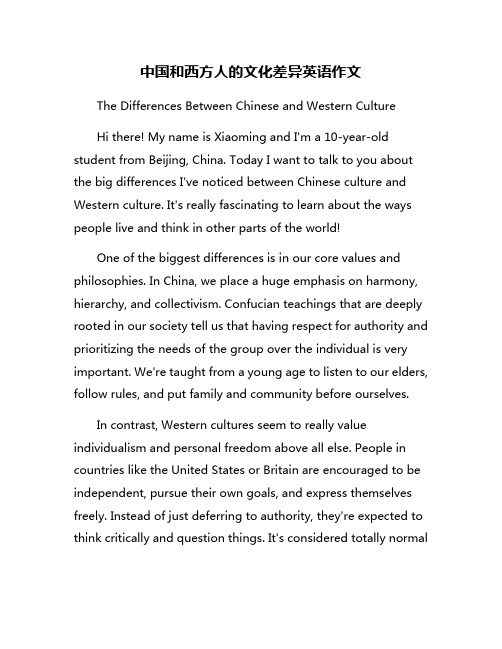
中国和西方人的文化差异英语作文The Differences Between Chinese and Western CultureHi there! My name is Xiaoming and I'm a 10-year-old student from Beijing, China. Today I want to talk to you about the big differences I've noticed between Chinese culture and Western culture. It's really fascinating to learn about the ways people live and think in other parts of the world!One of the biggest differences is in our core values and philosophies. In China, we place a huge emphasis on harmony, hierarchy, and collectivism. Confucian teachings that are deeply rooted in our society tell us that having respect for authority and prioritizing the needs of the group over the individual is very important. We're taught from a young age to listen to our elders, follow rules, and put family and community before ourselves.In contrast, Western cultures seem to really value individualism and personal freedom above all else. People in countries like the United States or Britain are encouraged to be independent, pursue their own goals, and express themselves freely. Instead of just deferring to authority, they're expected to think critically and question things. It's considered totally normaland healthy for kids to talk back to their parents or teachers sometimes if they disagree!Another major difference is our attitudes towards modesty and privacy. Chinese people tend to be quite reserved, humble, and private, especially in public settings. We're taught that it's rude and impolite to be loud, boastful, or too open about our personal lives. But from what I can tell, many Westerners are a lot more outgoing, outspoken, and comfortable with public displays of emotion or affection. They seem to have no problem bragging about their achievements or sharing intimate details with total strangers!Our views on family, dating, and marriage are also really different. In China, the whole extended family is incredibly important. We live with or near grandparents, aunts, uncles, and cousins. Our parents tend to be very involved in deciding who we date and marry. But I hear that in Western families, once you become an adult you're pretty much expected to move out and become fully independent. And people usually choose their own boyfriends/girlfriends based solely on romantic love.Food is another area of big contrast. Chinese cuisine is all about finding the perfect balance of flavors and achieving harmony through ingredients. We use lots of fresh vegetables,rice, noodles, soy, ginger, garlic and herbs. Western food seems to rely way more on meat, cheese, bread and heavy sauces. Those rich, salty dishes would be considered overpowering and unhealthy in traditional Chinese cooking. And we would never ever eat dessert OR drink milk with our main meal like Westerners do - that's a huge no-no!Let's not forget clothing too. Chinese people have historically favored modest dress with simple colors, straight lines and looser fits, influenced by philosophies like Taoism. But modern Western fashion is all about showing off the body's shape in tighter, brighter, shorter, more revealing styles. We'd consider lots of typical American outfits like crop tops orshort-shorts to be too racy and informal for daily wear.I could go on and on about other fascinating cultural gaps related to art, music, holidays, school systems and so on. For example, while Chinese students are drilled constantly on rote memorization and testing, I understand Western classrooms emphasize creativity, hands-on projects and self-expression a lot more. We have such fundamentally different perspectives and ways of operating in the world!At the end of the day, I don't think one culture is necessarily better than the other - they're just different. To an outsider, bothcan seem strange, impractical or even rude at times. It really just comes down to what values, customs and habits you've absorbed since birth. This huge diversity in how humans think and behave across the globe is what makes learning about other cultures so endlessly interesting and enriching!I'm definitely planning to study abroad in a Western country when I get older. As much as I love and respect my own heritage, I'm really curious to experience a completely different lifestyle and way。
中西文化不同英语作文
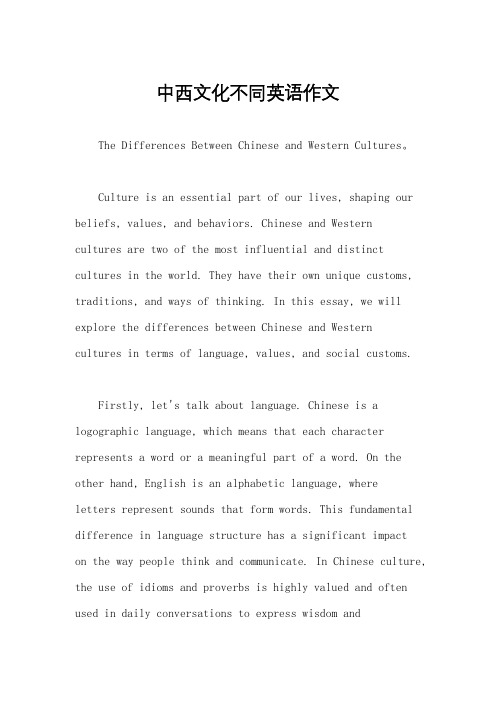
中西文化不同英语作文The Differences Between Chinese and Western Cultures。
Culture is an essential part of our lives, shaping our beliefs, values, and behaviors. Chinese and Westerncultures are two of the most influential and distinct cultures in the world. They have their own unique customs, traditions, and ways of thinking. In this essay, we will explore the differences between Chinese and Westerncultures in terms of language, values, and social customs.Firstly, let's talk about language. Chinese is a logographic language, which means that each character represents a word or a meaningful part of a word. On the other hand, English is an alphabetic language, whereletters represent sounds that form words. This fundamental difference in language structure has a significant impacton the way people think and communicate. In Chinese culture, the use of idioms and proverbs is highly valued and often used in daily conversations to express wisdom andexperience. In Western culture, direct and explicit communication is more common, and people tend to be more assertive in expressing their thoughts and opinions.Secondly, values play a crucial role in shapingcultural differences. In Chinese culture, the emphasis is placed on collectivism, harmony, and respect for authority. Family is considered the most important social unit, and filial piety is a deeply ingrained value. Confucianism, with its emphasis on social hierarchy and moral values, has had a profound influence on Chinese society. In contrast, Western culture values individualism, personal freedom, and equality. Independence and self-expression are highly regarded, and people are encouraged to pursue their own goals and aspirations. The Protestant work ethic, which emphasizes hard work, frugality, and individual responsibility, has played a significant role in shaping Western values.Finally, social customs in Chinese and Western cultures differ in many aspects. In Chinese culture, the concept of "face" is crucial, and people are often concerned aboutsaving face and avoiding embarrassment. This leads to indirect communication and the use of subtle gestures and cues to convey messages. In Western culture, direct and straightforward communication is valued, and people are more comfortable expressing their thoughts and feelings openly. Additionally, social etiquette and manners vary between the two cultures. For example, in Chinese culture, it is customary to address people by their titles and use formal greetings, while in Western culture, first-name basis and casual greetings are more common.In conclusion, Chinese and Western cultures aredistinct in their language, values, and social customs. Understanding and appreciating these differences can help foster better cross-cultural communication and cooperation. By recognizing and respecting the unique aspects of each culture, we can bridge the gap between East and West and build a more harmonious and inclusive global community.。
中国人与西方人的文化差异英语作文
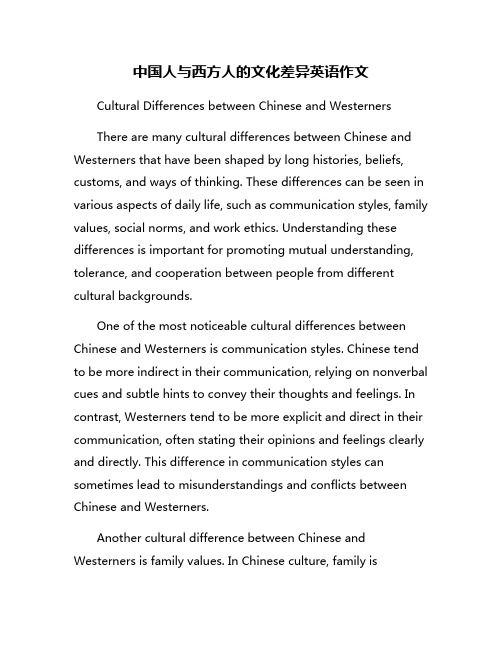
中国人与西方人的文化差异英语作文Cultural Differences between Chinese and WesternersThere are many cultural differences between Chinese and Westerners that have been shaped by long histories, beliefs, customs, and ways of thinking. These differences can be seen in various aspects of daily life, such as communication styles, family values, social norms, and work ethics. Understanding these differences is important for promoting mutual understanding, tolerance, and cooperation between people from different cultural backgrounds.One of the most noticeable cultural differences between Chinese and Westerners is communication styles. Chinese tend to be more indirect in their communication, relying on nonverbal cues and subtle hints to convey their thoughts and feelings. In contrast, Westerners tend to be more explicit and direct in their communication, often stating their opinions and feelings clearly and directly. This difference in communication styles can sometimes lead to misunderstandings and conflicts between Chinese and Westerners.Another cultural difference between Chinese and Westerners is family values. In Chinese culture, family isconsidered to be the most important social unit, and family relationships are highly valued. Filial piety, respect for elders, and the importance of maintaining harmony within the family are deeply ingrained in Chinese culture. In contrast, Westerners tend to value individualism and personal freedom more highly, and may place less emphasis on family relationships and obligations.Social norms and etiquette also differ between Chinese and Westerners. For example, in Chinese culture, it is common to greet others with a bow or a nod of the head, while in Western culture, a handshake or a hug may be more common. Additionally, concepts of personal space, gift-giving, and dining etiquette may vary between Chinese and Western cultures, leading to potential misunderstandings and cultural faux pas.Work ethics and attitudes towards work also differ between Chinese and Westerners. In Chinese culture, hard work, perseverance, and dedication are highly valued, and there is a strong emphasis on achieving success through diligence and effort. In contrast, Westerners may prioritize work-life balance, creativity, and innovation, and may have different expectations regarding work hours, responsibilities, and career advancement.Despite these cultural differences, it is important to recognize that there is no one-size-fits-all approach tounderstanding Chinese and Western cultures. Cultural differences are complex and multifaceted, and individuals may vary in their beliefs, values, and behaviors within their own cultural group. By engaging in cross-cultural communication, fostering mutual respect, and seeking to understand and appreciate the cultural differences between Chinese and Westerners, we can build stronger relationships, promote cultural diversity, and enhance global cooperation and understanding.。
中西方文化比较英语作文
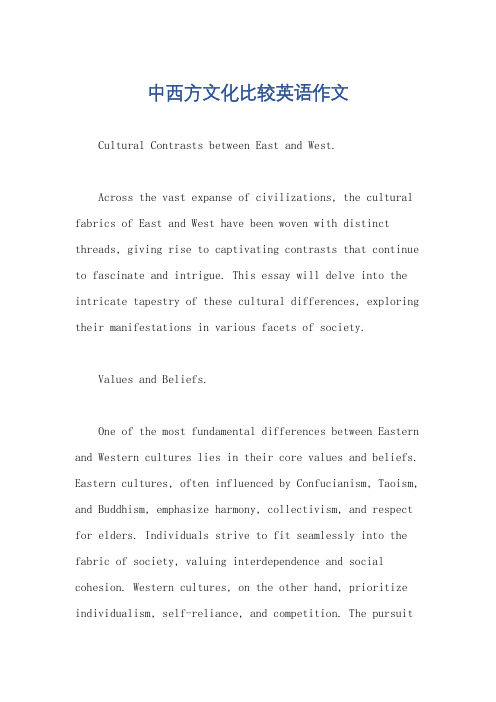
中西方文化比较英语作文Cultural Contrasts between East and West.Across the vast expanse of civilizations, the cultural fabrics of East and West have been woven with distinct threads, giving rise to captivating contrasts that continue to fascinate and intrigue. This essay will delve into the intricate tapestry of these cultural differences, exploring their manifestations in various facets of society.Values and Beliefs.One of the most fundamental differences between Eastern and Western cultures lies in their core values and beliefs. Eastern cultures, often influenced by Confucianism, Taoism, and Buddhism, emphasize harmony, collectivism, and respect for elders. Individuals strive to fit seamlessly into the fabric of society, valuing interdependence and social cohesion. Western cultures, on the other hand, prioritize individualism, self-reliance, and competition. The pursuitof personal success and self-actualization holds paramount importance.Communication Styles.The diverse cultural backgrounds of East and West have shaped contrasting communication styles. In Eastern cultures, communication tends to be indirect, nuanced, and context-dependent. Speakers often rely on subtle cues, gestures, and unspoken understandings. Western cultures, in contrast, favor direct and explicit communication. Speakers aim to convey their thoughts and ideas clearly and concisely, leaving little room for interpretation.Perception of Time.The perception of time reflects a profound cultural divide. Eastern cultures often view time as cyclical and fluid. Past, present, and future are interconnected, with the present being a transient moment within the grander scheme of existence. Western cultures, however, tend to perceive time as linear and irreversible. Time is seen as aprecious commodity that must be managed and utilized efficiently.Approaches to Education.Educational systems in the East and West differ significantly in their objectives and methodologies. Eastern education traditionally focuses on rote memorization, respect for authority, and the transmission of cultural traditions. Students are expected to conform to established norms and hierarchies. Western education, on the other hand, emphasizes critical thinking, creativity, and the development of individual potential. Students are encouraged to question, experiment, and explore new ideas.Social Stratification.Social stratification systems also exhibit contrasting patterns between East and West. Eastern cultures often maintain a hierarchical structure, with individuals assigned to specific social classes based on factors such as family background, social status, and economic wealth.Western cultures, while still exhibiting some degree of social stratification, have generally embraced greater social mobility and equality.Role of Religion.Religion plays a pivotal role in shaping cultural values and practices. In Eastern cultures, religions such as Buddhism, Confucianism, and Taoism have deeply influenced ethical systems, social norms, and artistic expressions. Western cultures, on the other hand, have been marked by a separation between church and state. While Christianity has been a major force in shaping Western values, its influence has declined in recent decades.Conclusion.The cultural tapestry of East and West is intricately woven with unique threads that create a vibrant and diverse world. The contrasts between these regions manifest themselves in a wide range of aspects, from values and beliefs to communication styles, perception of time,educational approaches, social stratification, and the role of religion. By understanding and appreciating these differences, we can foster cross-cultural dialogue, promote tolerance, and enrich our global society.。
中国文化和西方文化的不同英语作文
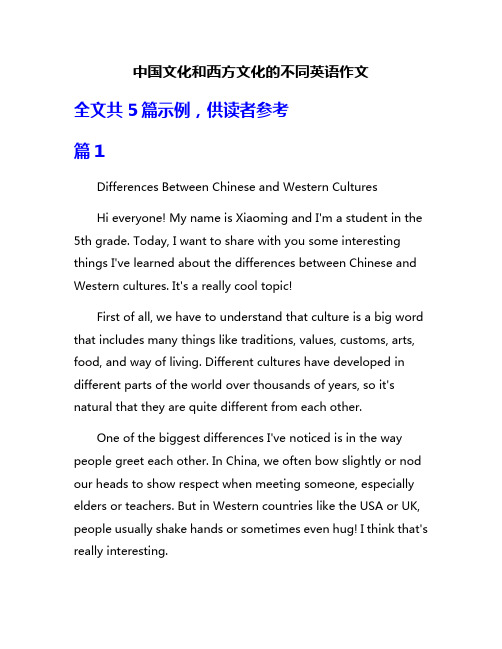
中国文化和西方文化的不同英语作文全文共5篇示例,供读者参考篇1Differences Between Chinese and Western CulturesHi everyone! My name is Xiaoming and I'm a student in the 5th grade. Today, I want to share with you some interesting things I've learned about the differences between Chinese and Western cultures. It's a really cool topic!First of all, we have to understand that culture is a big word that includes many things like traditions, values, customs, arts, food, and way of living. Different cultures have developed in different parts of the world over thousands of years, so it's natural that they are quite different from each other.One of the biggest differences I've noticed is in the way people greet each other. In China, we often bow slightly or nod our heads to show respect when meeting someone, especially elders or teachers. But in Western countries like the USA or UK, people usually shake hands or sometimes even hug! I think that's really interesting.Another major difference is in our foods. Chinese cuisine is known for its delicious flavors and use of ingredients like rice, noodles, soy sauce, and tea. We also love to eat with chopsticks! On the other hand, Western foods are often based on bread, meat, cheese, and wine. Their eating utensils are usually forks, knives, and spoons.Family values are also quite different. In Chinese culture, we have a strong emphasis on respecting and taking care of our elders, like grandparents. Children are expected to obey their parents and work hard in school to bring honor to the family. But in many Western cultures, children are encouraged to be more independent and make their own choices from a young age.Speaking of school, the education systems are quite different too! In China, we have strict discipline and a lot of emphasis on exams and scores. Students often stay late after school for extra classes or tutoring. But in Western schools, there is more focus on creativity, group projects, and overall development of the child.Holidays and festivals are another area where cultures differ a lot. In China, we celebrate events like Chinese New Year,Mid-Autumn Festival, and Dragon Boat Festival. These involve traditions like setting off firecrackers, eating mooncakes, anddragon boat racing. Western holidays like Christmas, Easter, and Thanksgiving have their own unique customs like decorating Christmas trees, egg hunting, and having big turkey dinners.I also find the differences in arts and crafts really fascinating. Chinese arts like calligraphy, paper cutting, and painting with ink brushes have been practiced for centuries. In contrast, Western arts are more focused on things like oil paintings, sculpting, and modern abstract art.Of course, these are just some of the many differences between our cultures. But I think it's amazing how diverse the world is, with so many rich traditions and ways of life. Learning about different cultures helps us appreciate and respect each other better.Even though we may do things differently, I believe all cultures have something valuable to offer. We should keep an open mind, be curious to learn from each other, and focus on the things that bring us together as human beings.I hope you found my essay interesting and informative. Let me know if you have any other thoughts or questions! Thanks for reading.篇2Hi,大家好!我是小明,今天我要给大家写一篇关于中国文化和西方文化不同的英语作文。
中西文化对比英文作文
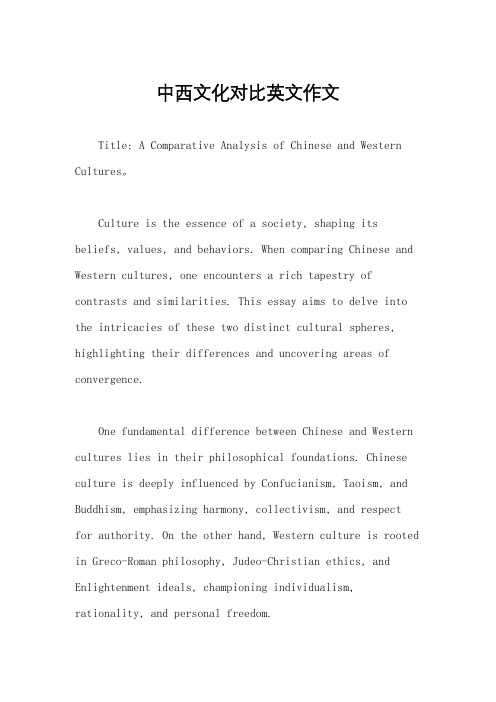
中西文化对比英文作文Title: A Comparative Analysis of Chinese and Western Cultures。
Culture is the essence of a society, shaping its beliefs, values, and behaviors. When comparing Chinese and Western cultures, one encounters a rich tapestry of contrasts and similarities. This essay aims to delve into the intricacies of these two distinct cultural spheres, highlighting their differences and uncovering areas of convergence.One fundamental difference between Chinese and Western cultures lies in their philosophical foundations. Chinese culture is deeply influenced by Confucianism, Taoism, and Buddhism, emphasizing harmony, collectivism, and respectfor authority. On the other hand, Western culture is rooted in Greco-Roman philosophy, Judeo-Christian ethics, and Enlightenment ideals, championing individualism, rationality, and personal freedom.Language is another pivotal aspect that distinguishes Chinese and Western cultures. Chinese, with its intricate characters and tonal variations, reflects the cultural reverence for tradition and symbolism. In contrast, Western languages like English, with their alphabetic scripts and diverse linguistic origins, mirror the dynamic and pragmatic nature of Western societies.Social organization and etiquette also differ significantly between Chinese and Western cultures. In China, hierarchical relationships and social harmony are paramount, manifesting in elaborate protocols for addressing and interacting with others. Conversely, Western societies tend to prioritize egalitarianism and direct communication, often valuing individual expression over conformity to social norms.Cuisine provides yet another lens through which to examine cultural differences. Chinese cuisine, with its emphasis on balance, texture, and symbolism, reflects the holistic approach to health and well-being ingrained inChinese culture. In contrast, Western cuisine, characterized by diverse flavors and culinary experimentation, embodies the spirit of exploration and innovation prevalent in Western societies.Religious beliefs and practices also vary between Chinese and Western cultures. While China has a rich tapestry of religious traditions, including Buddhism, Taoism, and Confucianism, it also exhibits a secular outlook shaped by decades of Communist rule. In contrast, Western societies are predominantly Christian, with diverse denominations and varying degrees of religious observance.Art and aesthetics offer yet another fascinating arena for cultural comparison. Chinese art, with its emphasis on symbolism, harmony, and nature, reflects the philosophical underpinnings of Chinese culture. Western art, characterized by realism, individual expression, and innovation, embodies the spirit of creativity and exploration that defines Western societies.Education is yet another realm where Chinese andWestern cultures diverge. In China, education is highly valued and seen as a means to upward social mobility, leading to intense competition and emphasis on rote memorization. In contrast, Western education systems prioritize critical thinking, creativity, and holistic development, aiming to nurture well-rounded individuals capable of adapting to an ever-changing world.Despite these differences, Chinese and Western cultures also share commonalities and points of convergence. Both value family and community, albeit expressing it in different ways. Both appreciate art, literature, and music as vehicles for self-expression and cultural enrichment. Moreover, globalization and intercultural exchange have led to increasing hybridization and mutual influence between Chinese and Western cultures, blurring the lines and creating new cultural forms and expressions.In conclusion, the comparison between Chinese and Western cultures reveals a complex interplay of differences and similarities, each enriching the global tapestry of human civilization. By appreciating and understanding thesecultural nuances, we can foster greater cross-cultural understanding and collaboration in an increasingly interconnected world.。
- 1、下载文档前请自行甄别文档内容的完整性,平台不提供额外的编辑、内容补充、找答案等附加服务。
- 2、"仅部分预览"的文档,不可在线预览部分如存在完整性等问题,可反馈申请退款(可完整预览的文档不适用该条件!)。
- 3、如文档侵犯您的权益,请联系客服反馈,我们会尽快为您处理(人工客服工作时间:9:00-18:30)。
大学英语作文之中西方文化对比 Lines and Circles,West
and East
Everything is relative, cultural difference being no exception. Culture, as the total pattern of human behavior and its products, oversteps geographical limits and historical conditions in many ways, and it is characterized by its strong penetrativeness and fusibility.
The advancement of the globalized economy and the rapidity and ease of modern communication, transportation, and mass media have resulted in an ever increasing exchange between cultures, unprecedented in scale, scope, and speed. Consequently, an increase in universality and a reduction in difference between cultures is an inevitable trend. It is no surprise to see phenomena characteristic of one culture existing in another. As a result, some people even fear that the world will become a dull place when all the different nationalities behave exactly alike.Nevertheless, the “cultural sediment” formed through long-range accumulation is not to be easily removed, and the cultural tradition handed down from generation to generation shows great consistency and continuity. The cultures of different regions and nations still have their own distinctive peculiarities, and therefore significance still needs to be attached to the study of the individualities of different cultures against the background of their universality.
By and large, linearity and circularity can be used to indicate the major
difference between Western and Chinese cultures. “Western culture” here is a general term, putting aside its interior regional diversities in order to contrast it with Chinese culture. A circle is a round enclosure. A line is a narrow continuous mark. The contrast between the linearity of Western culture and the circularity of Chinese culture embodies itself in such aspects as worldview, core value, outlook on time, and mode of thinking.。
